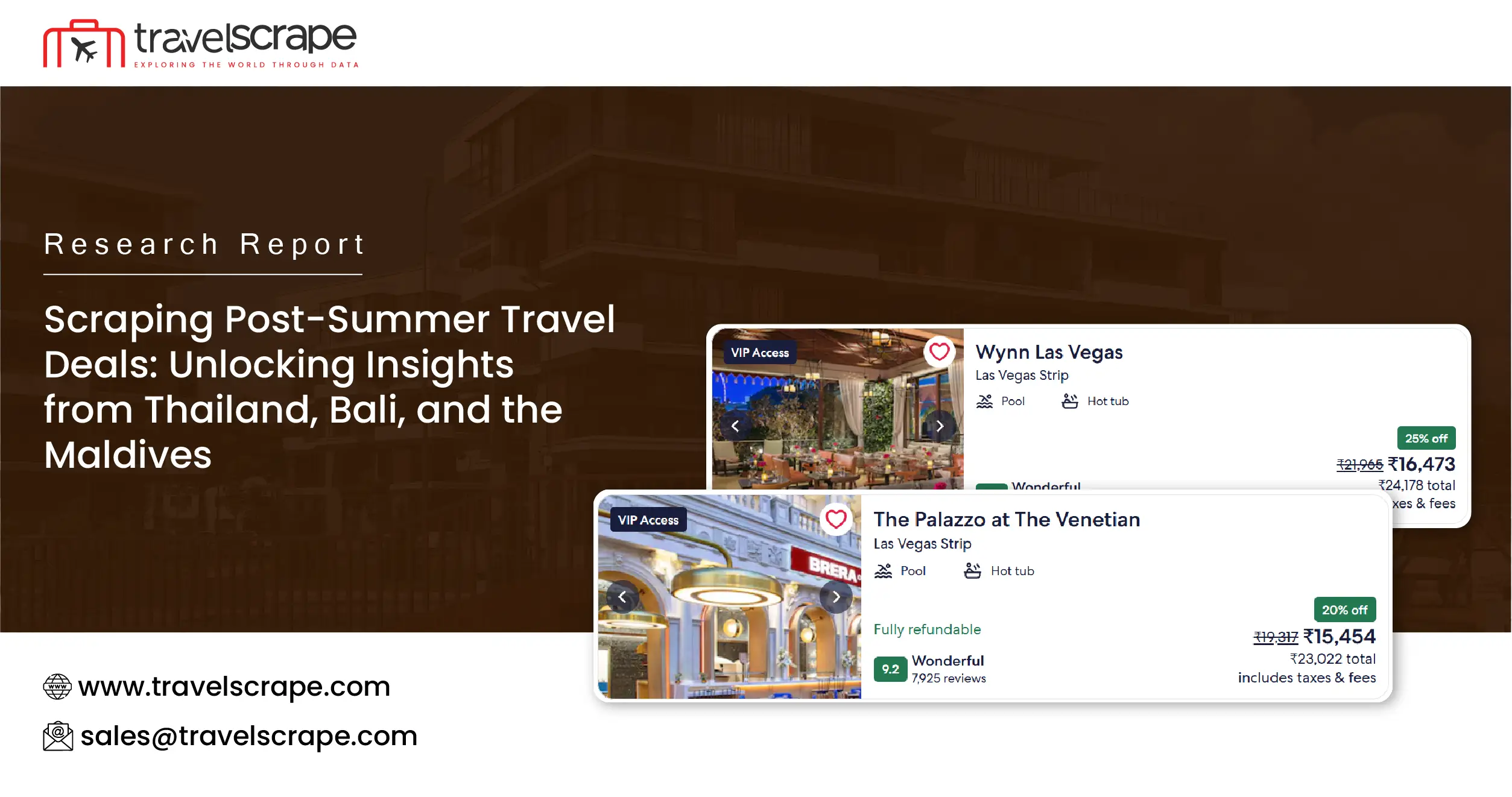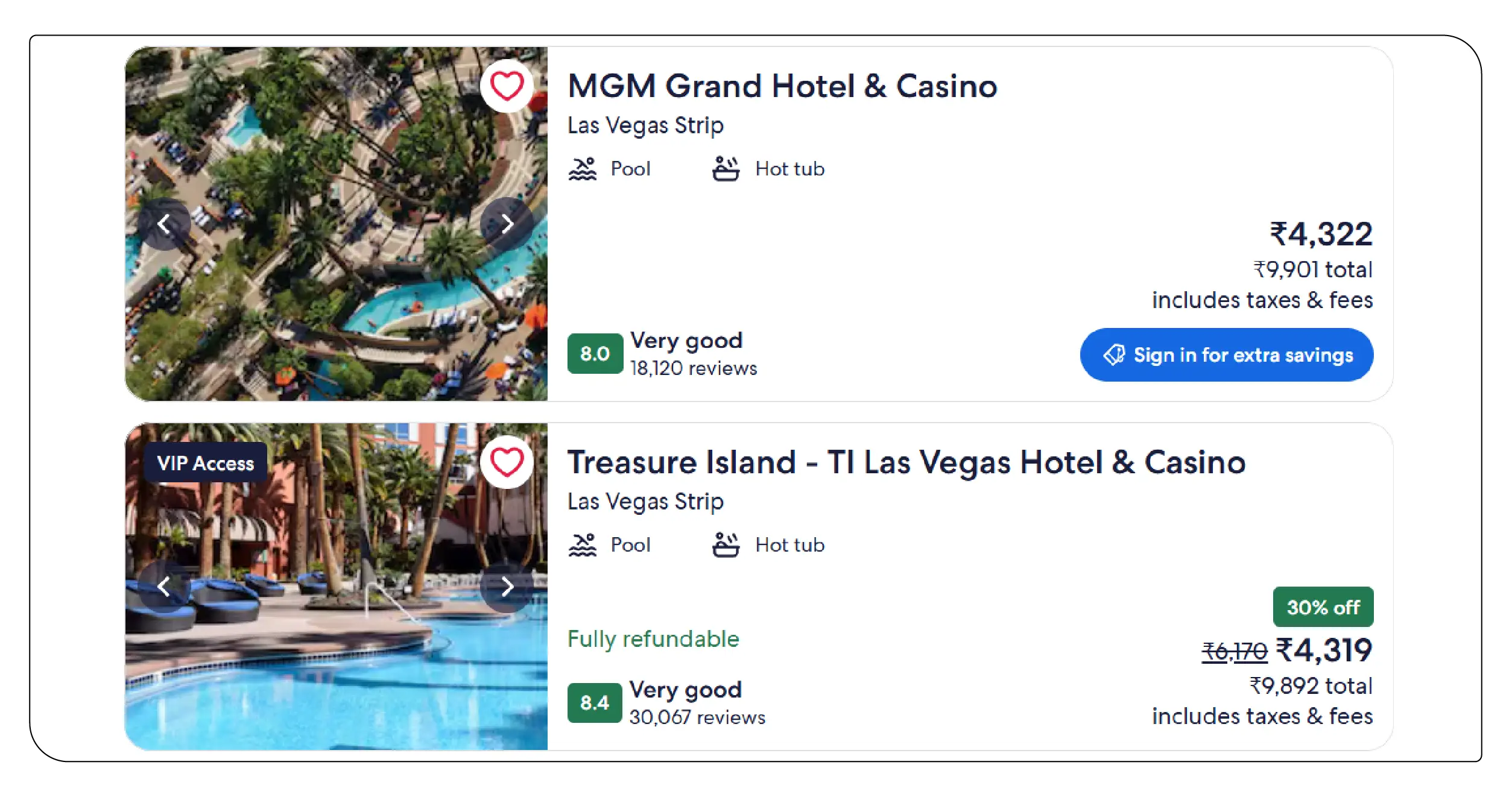Scraping Post-Summer Travel Deals: Unlocking Insights from Thailand, Bali, and the Maldives

Introduction
As the global travel industry transitions from the busy summer rush to the quieter months of September through November, the Post-Summer Shoulder Season emerges as a unique opportunity for travelers and businesses alike. This period offers affordability, reduced crowds, and diverse experiences across popular destinations like Thailand, Bali, and the Maldives. The availability of real-time pricing and rental data enables analysts to uncover valuable market trends and opportunities during this season. Leveraging advanced tools such as Scraping Post-Summer Travel Deals, researchers and businesses can compare dynamic pricing strategies across regions using the Vacation Rental Listing Dataset.
In Southeast Asia, where tropical weather, diverse cultures, and seasonal festivals attract millions, the shoulder season offers valuable insights into price fluctuations. Utilizing Southeast Asia hotel price scraping, this report examines how hotel chains, resorts, and vacation rentals in Thailand, Bali, and the Maldives adjust their pricing and promotions. It also considers the role of vacation rental platforms, airlines, and travel agencies in shaping traveler decision-making. This research report undertakes a comparative price study, evaluates shifts in demand, and highlights how data scraping technologies reveal hidden opportunities in the post-summer travel landscape.
The Post-Summer Shoulder Season: Defining the Landscape

The Shoulder Season for Thailand, Bali, and the Maldives
The shoulder season refers to the transitional period between the peak and off-peak travel seasons. For Thailand, Bali, and the Maldives, this typically spans September to mid-November. While the weather can be less predictable—ranging from tropical showers to humid spells—this season also provides notable benefits:
- Lower accommodation and flight costs.
- Increased availability of luxury resorts and rentals.
- More personalized guest experiences due to reduced tourist crowds.
- Unique cultural festivals and local events.
For businesses, the season presents an opportunity to refine promotional strategies, target niche travelers, and prepare for the surge in demand during upcoming holidays. By integrating Vacation Rental Data Scraping Services , stakeholders gain a competitive edge in understanding the micro-fluctuations in pricing and availability during this period.
Thailand: Off-Peak Travel and Package Deals
Thailand remains one of the most versatile travel destinations in Southeast Asia. During the shoulder season, Bangkok, Phuket, and Chiang Mai see a shift from crowded tourist hotspots to quieter streets and more affordable accommodations.
One striking trend is the reduction in package tour prices. With fewer inbound international tourists, operators adjust their pricing to remain competitive. By using Thailand off-peak travel package scraping, analysts can identify price cuts of 20–35% compared to peak season packages. Luxury resorts in Phuket, for example, reduce their minimum stay requirements and include complimentary services such as airport transfers or spa credits.
Domestic travel also influences pricing, as Thai residents take advantage of discounts. Mid-sized hotels compete aggressively with international chains, creating a favorable environment for both travelers and travel aggregators to negotiate lower rates. Businesses employing Travel Aggregators Data Scraping Services can consolidate such fluctuations into actionable insights.
Bali: Competitive Vacation Rental Dynamics
Bali’s rental market undergoes distinct transformations after the summer. While luxury resorts remain popular, the island’s vacation rental ecosystem—comprising villas, boutique guesthouses, and homestays—becomes highly competitive. Demand from digital nomads and long-stay tourists rises during this period, as they seek affordable living while avoiding summer’s inflated prices. Average nightly villa rates in Ubud or Seminyak decrease by up to 25%, while beachfront properties in Canggu remain relatively resilient due to consistent surfing tourism.
Here, the role of Bali post-summer vacation rental scraping becomes critical. Platforms like Airbnb and Booking.com often show dynamic adjustments based on short-term occupancy shifts. Analysts who rely on scraping tools can track how hosts use flexible pricing strategies tied to seasonal dips.
Vacation rentals also reveal a new layer of customer behavior: longer booking durations. While peak season guests often stay for 4–6 nights, shoulder season visitors extend stays to 2–3 weeks. This reflects the affordability factor and the trend of remote working.
Maldives: Luxury Resorts Adjusting to Demand
The Maldives is synonymous with luxury travel; yet, even this high-end market is adapting to post-summer realities. Between September and early November, the monsoon season begins to taper off, creating attractive offers for early honeymooners and adventure seekers.
Resorts often offer “shoulder-season bundles” that include complimentary meals, complimentary seaplane transfers, and discounts on water activities. Compared to the December holiday rush, prices drop by 15–25%. Real-time monitoring through Real-time scraping of Maldives holiday price drops enables businesses to quantify these reductions and tailor their marketing to travelers looking for premium yet affordable getaways.
Unlike Bali or Thailand, the Maldives' pricing is highly influenced by international travel agents and online booking platforms. This centralization allows analysts to Scrape Top Travel Data Sources and compare consistency across different distribution channels. Interestingly, the Maldives also exhibits less variation in long-stay rentals, since tourism here is still overwhelmingly resort-driven rather than home-based.
Comparative Data Insights
To illustrate these shifts, the following table compares average hotel and rental prices in Thailand, Bali, and the Maldives during the shoulder season with peak summer rates.
Table 1: Comparative Price Reductions in Shoulder Season (Average per Night, USD)
| Destination | Peak Summer Rate | Shoulder Season Rate | % Reduction |
|---|---|---|---|
| Thailand (Phuket 4-star hotel) | $160 | $120 | 25% |
| Thailand (Bangkok 3-star hotel) | $90 | $65 | 28% |
| Bali (Seminyak villa) | $250 | $190 | 24% |
| Bali (Ubud boutique guesthouse) | $120 | $85 | 29% |
| Maldives (Luxury resort) | $800 | $640 | 20% |
| Maldives (All-inclusive package) | $950 | $720 | 24% |
This table reflects how reductions are more pronounced in Thailand and Bali across mid-range rentals, while the Maldives sustains higher baseline pricing but still offers significant discounts.
Role of Data Scraping in Market Analysis
Data scraping has become the backbone of post-summer travel research. By extracting information from vacation rental platforms, hotel booking sites, and travel agency portals, analysts obtain a granular view of price trends. Whether through Travel Aggregators Data Scraping Services or bespoke tools for scraping vacation rental data, businesses gain real-time intelligence on demand.
Key applications include:
- Dynamic Pricing Monitoring – Detecting how resorts alter rates daily.
- Occupancy Tracking – Estimating booking patterns based on availability calendars.
- Competitor Benchmarking – Comparing across regions and platforms.
- Consumer Behavior Analysis – Identifying shifts toward long-term stays or last-minute bookings.
Such insights assist travel agencies in customizing promotional campaigns and allow hotels to adjust loyalty programs.
Seasonal Variations and Local Influences
Beyond pricing, cultural and seasonal influences play a significant role in shaping travel deals. In Thailand, the “Vegetarian Festival” in Phuket attracts niche tourists in October, driving a temporary price surge. Bali’s temple festivals similarly create micro-peaks in local tourism.
The Maldives relies heavily on diving seasons, with September marking the start of clearer waters. These local contexts underscore why static datasets are insufficient—continuous monitoring is necessary for accurate analysis.
The availability of Vacation Rental Data Scraping Services ensures that analysts do not miss short-lived spikes or discounts tied to such cultural events.
Long-Stay and Remote Work Travelers
Another major factor reshaping the post-summer season is the rise of remote work. Digital nomads and professionals take advantage of flexible schedules to extend their stays in Bali or Thailand. This alters demand curves significantly.
While Bali witnesses a surge in month-long villa rentals, Thailand’s urban hubs like Chiang Mai see demand for co-living spaces and affordable hotels with strong Wi-Fi infrastructure. In contrast, the Maldives has yet to fully capitalize on this trend due to its resort-centric infrastructure.
Scraping tools provide visibility into these longer-stay booking options, showing how pricing per night decreases as length-of-stay increases. Analysts leveraging Vacation Rental Listing Dataset insights can forecast future revenue streams for property owners catering to this demographic.
Price Tracking via Travel Aggregators
Travel aggregators like Expedia, Agoda, and Booking.com dominate the online booking landscape. They also serve as crucial data hubs. For instance, aggregators often provide bundled deals—combining flights, hotels, and activities—that significantly impact consumer decision-making.
By applying Travel Aggregators Data Scraping Services, businesses can measure how bundled offers compare against standalone bookings. In many cases, discounts range from 10–20% when packages are purchased.
Table 2: Sample Aggregator Bundle vs Standalone Rates (Thailand, Bali, Maldives)
| Destination | Standalone Hotel (per night) | Standalone Flight (round trip) | Bundle Price (Hotel + Flight) | Savings |
|---|---|---|---|---|
| Thailand (Phuket) | $120 | $450 | $510 | $60 |
| Bali (Seminyak) | $190 | $500 | $615 | $75 |
| Maldives (Resort) | $640 | $950 | $1420 | $170 |
Such comparative data highlights why aggregators remain vital in pricing strategies, both for travelers and for businesses benchmarking competition.
Future Outlook: Toward Holiday Surge

While the shoulder season presents affordability, it also acts as a precursor to the year-end festival boom. Prices begin to rise steadily in late November as Diwali, Christmas, and New Year draw closer.
Businesses that engage in method to Scrape Top Travel Data Sources can track the transition from shoulder-season lows to festival highs, optimizing their campaigns accordingly. Airlines, in particular, employ dynamic fare systems that adjust daily based on demand signals.
Thus, continuous monitoring is not just about securing off-season deals—it also helps forecast price surges that are inevitable during the holidays.
Conclusion
The post-summer shoulder season in Thailand, Bali, and the Maldives offers a unique window for affordable yet enriching travel experiences. Through careful monitoring of hotel, rental, and package pricing, analysts and businesses can identify cost-saving opportunities and optimize promotional strategies. Tools such as Vacation Rental Data Scraping Services and advanced aggregator monitoring allow for granular insights that static research cannot provide.
Ultimately, the ability to harness Post-summer travel insights through scraping vacation data enables businesses to stay competitive. Furthermore, applying Off-season tourism scraping analysis ensures preparedness for upcoming demand cycles. As destinations transition into the festive period, Festival Season Hotel Price Surge remains a critical consideration, reminding us that pricing in global tourism is a continuously evolving landscape shaped by both demand and data intelligence.
Ready to elevate your travel business with cutting-edge data insights? Get in touch with Travel Scrape today to explore how our end-to-end data solutions can uncover new revenue streams, enhance your offerings, and strengthen your competitive edge in the travel market.